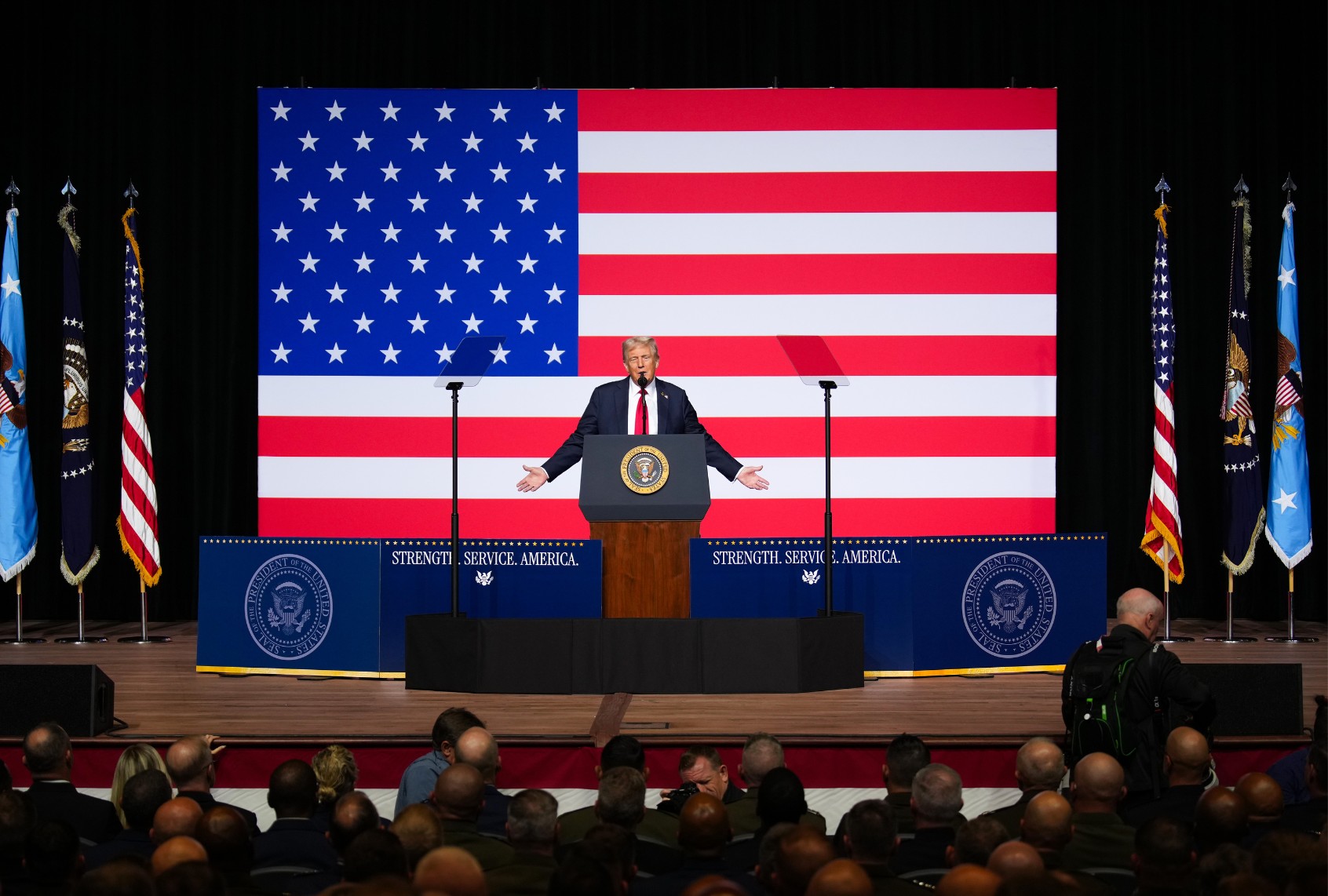He is not a complicated man, the president of the United States. Donald Trump is a 79-year-old who is going on 14, displaying without filter all the disordered thinking of a child reared in the insular bubble of wealthy, white America.
“I call it the N-word,” the American head of state said in remarks to the nation’s admirals and generals, speaking about a decision to deploy nuclear-powered submarines off the coast of Russia. “There are two N-words, and you can’t use either of them.”
He was greeted with steely silence, but the joke, if it was that, might well have killed in the classroom of a suburban high school.
To say that Trump operates on the level of a median racist adolescent is not intended as a cheap shot, but analysis that goes further in contextualizing his actions — and his success in politics — than the sort of explainers-for-liberals popular in his first term. We are well beyond the point of credibly arguing this is all about NAFTA.
Trump’s appeal is distilled in the even more explicit rhetoric of his followers.
Chaya Raichik, an adult woman who runs an account called “Libs of TikTok,” is not trying or perhaps capable of being subtle when she posts a photo of a Black politician like Minneapolis’ Omar Fateh and writes: “The average IQ in Somalia is 68.”
The late Charlie Kirk was not making an academic, delicate argument about assimilation and cultural cohesion when, in response to a video of that same dark-skinned, U.S.-born child of immigrants, he wrote: “Mass migration from the third world must be stopped.”
Similarly, the New York Young Republican Club was not appealing to — say what you will — the high-minded principles of a John Locke or even an Edmund Burke when it posted a photo of mayoral candidate Zohran Mamdani and asked White House officials to revoke his citizenship “and promptly deport him.”
And the far-right influencer and de facto White House advisor Laura Loomer wasn’t making a really interesting point about the global refugee crisis when, in response to a news report about 2,000 human beings perishing in the Mediterranean Sea, she wrote: “Good” — with a hand-clapping emoji — “Here’s to 2,000 more.”
We need your help to stay independent
That fascists are occasionally clever but not typically intelligent is both a blessing and a curse. It means, for example, that Trump and his allies are incapable of doing what is needed to be truly popular; we will not be seeing mass deportations paired with free, universal health care. But that alone is not consolation.
In their unvarnished brutishness, the MAGA movement is also playing politics on “easy” mode. It is not hard to play to people’s basest fears and insecurities — to assure the white and mediocre that there’s a person of a different color to blame for their middling performance in life; to promise the wimpy, embittered men of suburbia that they too can be bullies, vicariously, through Donald Trump and the agents of ICE.
It is more difficult to appeal to people’s better natures. But that also isn’t reason to despair: in cities across America, whatever their faults, majorities have assembled multiracial coalitions based on tolerance and mutual respect. And while American history is defined by swings between its progressive and reactionary ids ֫— the latter now putting on a pathetic show of its dominance — comfort can be taken, for now, in that these swings do not last forever.
Still, the future is not now. Trump and his coalition may only have the approval of the 4 in 10 Americans who view life through the dynamics and slights of the high school cafeteria, but the fragility of its power does not appear to be recognized at the top. A majority of white Americans is the only majority that appears to matter and for whom this administration is governing. And it is mobilizing the full force of the federal government in a self-described “war” against the “enemy within,” as Trump told those he perceives as his own generals, to ensure that minority majority can remain in power in the absence of true popular support.
Start your day with essential news from Salon.
Sign up for our free morning newsletter, Crash Course.
That is why cities, those multi-ethnic anathemas, are under siege, from Washington to Los Angeles. The president spoke of them not as the country’s leaders, for all their faults, once did — as quintessentially American melting pots in a nation of immigrants — but as “training grounds” for the U.S. military, urging men trained for war to help him “straighten them out, one by one.”
“They spit,” Trump said of those Americans who oppose domestic military occupations, “we hit.”
Lest the president’s remarks be insufficient to demonstrate the point that other Americans, with their competing vision of a country made great through its incredible diversity, we can once again rely on his supporters. “I want blood in the streets,” wrote the editor-at-large of The Daily Caller, a right-wing news outlet founded by former Fox News personality Tucker Carlson. “Is this a call for violence? Yes. Explicitly it is.”
A better world with a better version of America is still possible, a fact demonstrated by Trump and his allies feeling the need to quash any alternative to MAGA with military force. Like a child with a gun, their relative weakness — the performative masculinity of an insecure adolescent — should not blind us to the harm they can cause, nor assure anyone that their failure is inevitable. But we should also not despair: theirs is a small, fearful, ugly America and, try as they might, they will never extinguish the hopeful vision and, for many Americans, the lived experience of a diverse and beautiful country that treats with dignity all who call it home.
Read more
about Trump 2.0


